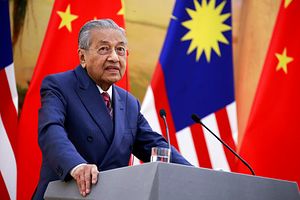Last week, we witnessed the much-anticipated return of Malaysian Prime Minister Mahathir Mohamad back to the international stage with his first attendance at the UN General Assembly in New York since he reassumed the premiership after a shock election victory in May. While his engagements may have offered some indicators as to the extent of continuity and change on some of his long-held views on key issues, how that will translate into the conduct of Malaysian foreign policy under the new Pakatan Harapan (PH) government is much less certain.
As I have noted before in these pages and elsewhere, Malaysian foreign policy over the past five decades or so, broadly speaking, has emphasized the importance of fostering of closer bilateral ties with neighboring states, the expansion of the country’s role in regional and global fora, and an attempt to maintain equidistance between major powers, including the United States and China. Malaysia’s foreign policy under former prime minister Najib Razak had seen some successes – from the relative warming of Malaysia-Singapore ties to the cultivation of better ties with Washington to regional leadership on issues such as counterterrorism – but also significant challenges, including a meager defense budget, an underperforming economy, and a more divided country (See: “Malaysia’s Foreign Policy Challenges Loom After its 2018 Elections“).
Since the election of a new government in May and Mahathir’s dramatic return to the premiership, observers have been looking to see what this might mean for the future of Malaysian foreign policy. And while there have been other notable developments thus far, including his visits to major capitals including Beijing and Tokyo as well as remarks and interviews he has offered covering foreign policy issues, much hype was around Mahathir’s return to the international stage with his visit to New York, which, as I noted in a previous piece, included an address at the UN General Assembly as well as various speaking events and meetings with politicians, businesses, and Malaysians in New York (See: “Mahathir’s Visit Spotlights US-Malaysia Ties Under New Government”).
The engagements last week gave some indication of what Mahathir’s return might mean in terms of the broad contours of Malaysian foreign policy. During his address at the UN General Assembly, he not only offered areas where Malaysia was prepared to contribute internationally, such as terrorism, but was also not afraid to challenge the position of major powers and neighboring states on issues ranging from Israel-Palestine to the state of the Rohingya. At the Asia Society, he spoke candidly about both the opportunities and challenges the region faces due to China’s rise under President Xi Jinping.
For those familiar with Mahathir’s thinking on these subjects, most of his comments and even his general candor at these engagements was not surprising: indeed, if anything, the pattern confirms the sense that his long-held views have not changed much at all. It is also important not to dwell too much on what he is says – during Mahathir’s first tenure as premier, it was not uncommon for his hardline rhetoric to conceal much more complex realities at play in the actual conduct of Malaysia’s foreign policy, at times deliberately so on his part.
Beyond the engagements themselves, it is also imperative not to just extrapolate from Mahathir’s old views and his new round of rhetoric to get a sense of where Malaysia’s foreign policy is headed. For one, it is still early days: we are still just a few months into an unprecedented political change in Malaysia. We will get a better sense of where this government’s priorities are once progress is made on several incremental steps, including the unveiling of a new budget to come in early November.
Furthermore, while Mahathir’s views may not have changed, his ability to implement them may well have, which is partly a consequence of changes in the region and the world since his past time in office, Malaysia’s position within it, and his own domestic political position. Abroad, regional and global trends, such as the outpouring of populism, the pressure on multilateral organizations, and China’s rise, make managing Malaysia’s external ties more challenging. At home, Malaysia’s position, while still strong, is not quite what it was under Mahathir, with serious economic challenges inherited from the Najib years and structural reforms even more urgently needed. If Mahathir is to return Malaysia to its status as an Asian tiger economy as he has said, it will be a difficult goal to accomplish.
And though Mahathir’s position is strong, it is not what he was during his last time in office. While he of course still exerts significant influence over Malaysia’s domestic and foreign policy, he is also now only a caretaker prime minister in a multi-party coalition where only about a tenth of parliamentary seats are from his own party. He will thus face a more contested environment relative to his first tenure as premier. And for all the focus on Mahathir himself, observers would also do well to factor in how things may change if and when he turns over the reins to Anwar and the broader political environment in Malaysia evolves as well.
































